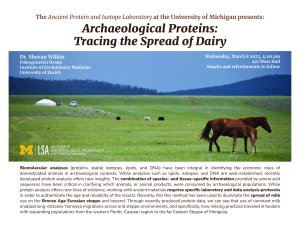Presented By: Museum of Anthropological Archaeology
Archaeological Proteins: Tracing the Spread of Dairy
Dr. Shevan Wilkin, Paleogenetics Group, Institute of Evolutionary Medicine, University of Zurich

Biomolecular analyses (proteins, stable isotopes, lipids, and DNA) have been integral in identifying the economic roles of domesticated animals in archaeological contexts. While analyses such as lipids, isotopes, and DNA are well-established, recently developed protein analysis offers new insights. The combination of species- and tissue-specific information provided by amino acid sequences have been critical in clarifying which animals, or animal products, were consumed by archaeological populations. While protein analysis offers new lines of evidence, working with ancient materials requires specific laboratory and data analysis protocols in order to authenticate the age and reliability of the results. Recently, this this method has been used to illuminate the spread of milk use on the Bronze Age Eurasian steppe and beyond. Through recently produced protein data, we can see that use of ruminant milk enabled long-distance Yamnaya migrations across arid steppic environments, and specifically, how milking practices traveled in tandem with expanding populations from the western Pontic-Caspian region to the far Eastern Steppe of Mongolia.
Snacks and refreshments to follow the lecture.
Snacks and refreshments to follow the lecture.